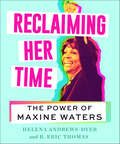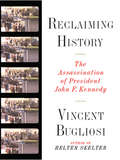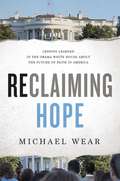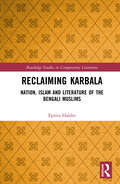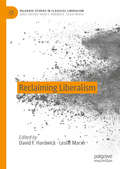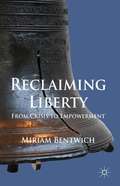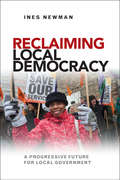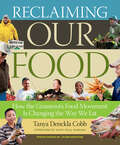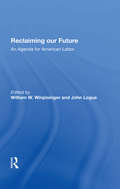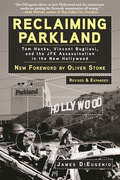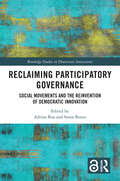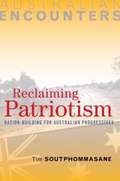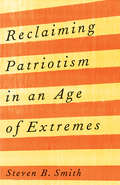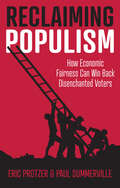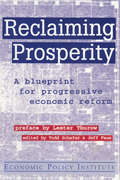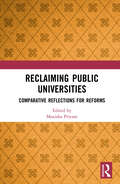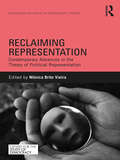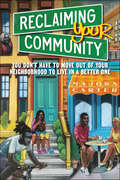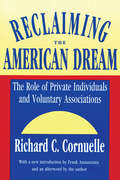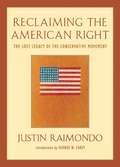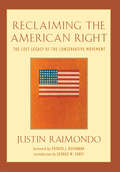- Table View
- List View
Reclaiming Her Time: The Power of Maxine Waters
by R. Eric Thomas Helena Andrews-DyerNamed a Best Political Book of the Year by The AtlanticIn the tradition of Notorious RBG, a lively, beautifully designed, full-color illustrated celebration of the life, wisdom, wit, legacy, and fearless style of iconic American Congresswoman Maxine Waters.“Let me just say this: I’m a strong black woman, and I cannot be intimidated. I cannot be undermined. I cannot be thought to be afraid of Bill O’Reilly or anyone.”—Maxine Waters To millions nationwide, Congresswoman Maxine Waters is a hero of the resistance and an icon, serving eye rolls, withering looks, and sharp retorts to any who dare waste her time on nonsense. But behind the Auntie Maxine meme is a seasoned public servant and she’s not here to play. Throughout her forty years in public service and eighty years on earth, U.S. Representative for California’s 43rd district has been a role model, a crusader for justice, a game-changer, a trailblazer, and an advocate for the marginalized who has long defied her critics, including her most vocal detractor, Donald J. Trump. And she’s just getting started. From her anti-apartheid work and support of affirmative action to her passionate opposition to the Iraq War and calls to hold Trump to account, you can count on Auntie Maxine to speak truth to power and do it with grace and, sometimes, sass. As ranking member of the House Financial Services Committee and one of the most powerful black women in America, she is the strong, ethical voice the country has always needed, especially right now.Reclaiming Her Time pays tribute to all things Maxine Waters, from growing up in St. Louis “too skinny” and “too black,” to taking on Wall Street during the financial crisis and coming out on top in her legendary showdowns with Trump and his cronies. Featuring inspiring highlights from her personal life and political career, beloved memes, and testimonies from her many friends and fans, Reclaiming Her Time is a funny, warm, and admiring portrait of a champion who refuses to stay silent in the face of corruption and injustice; a powerful woman who is an inspiration to us all.
Reclaiming History: The Assassination of President John F. Kennedy
by Vincent BugliosiFor fifty years the truth about the assassination of President John F. Kennedy has been obscured. This book releases us from a crippling distortion of American history. At 1:00 p.m. on November 22, 1963, President John F. Kennedy was pronounced dead, the victim of a sniper attack during his motorcade through Dallas. That may be the only fact generally agreed upon in the vast literature spawned by the assassination. National polls reveal that an overwhelming majority of Americans (75%) believe that there was a high-level conspiracy behind Lee Harvey Oswald. Many even believe that Oswald was entirely innocent. In this continuously absorbing, powerful, ground-breaking book, Vincent Bugliosi shows how we have come to believe such lies about an event that changed the course of history. The brilliant prosecutor of Charles Manson and the man who forged an iron-clad case of circumstantial guilt around O. J. Simpson in his best-selling Outrage Bugliosi is perhaps the only man in America capable of writing the definitive book on the Kennedy assassination. This is an achievement that has for years seemed beyond reach. No one imagined that such a book would ever be written: a single volume that once and for all resolves, beyond any reasonable doubt, every lingering question as to what happened in Dallas and who was responsible. There have been hundreds of books about the assassination, but there has never been a book that covers the entire case, including addressing every piece of evidence and each and every conspiracy theory, and the facts, or alleged facts, on which they are based. In this monumental work, the author has raised scholarship on the assassination to a new and final level, one that far surpasses all other books on the subject. It adds resonance, depth, and closure to the admirable work of the Warren Commission. Reclaiming History is a narrative compendium of fact, forensic evidence, reexamination of key witnesses, and common sense. Every detail and nuance is accounted for, every conspiracy theory revealed as a fraud on the American public. Bugliosi's irresistible logic, command of the evidence, and ability to draw startling inferences shed fresh light on this American nightmare. At last it all makes sense.
Reclaiming Hope: Lessons Learned in the Obama White House About the Future of Faith in America
by Michael R. Wear"An important and extremely timely book...Get it, read it, and talk to others about it." --Timothy Keller, author of Reason for God "A warm, engaging read of the author’s experience with faith, politics, and the intersection (and sometimes collision) of the two. Reclaiming Hope is an important contribution in this age of religious and political polarization." --J.D. Vance, author of Hillbilly Elegy Before he had turned twenty-one, Michael Wear found himself deep inside the halls of power in the Obama administration as one of the youngest-ever White House staffers. Appointed by the president in 2008 to the Office of Faith-based and Neighborhood Partnerships and later directing faith outreach for the president’s 2012 re-election campaign, Wear threw himself wholeheartedly into transforming hope into change, experiencing first-hand the highs and lows of working as a Christian in government. In this unvarnished account of faith inside the world’s most powerful office, Wear gives unprecedented insight into the most controversial stories of the last eight years, from the president’s change of position on gay marriage and the politicization of religious freedom to the administration’s failure to find common ground on abortion and the bitter controversy over who would give the benediction at the 2012 inauguration. Wear also reveals the behind-the-scenes struggles behind some of the administration’s signature achievements, including the adoption tax credit and making human trafficking a presidential priority. And he offers a rare window onto the ways the president himself viewed the role of faith in politics. More than a memoir of the Obama administration, Reclaiming Hope is also a passionate call for faith in the public square, particularly for Christians to see politics as a means of loving one’s neighbor and of pursuing justice for all while promoting racial reconciliation and fighting for religious freedom for people of all faiths. At a time when large numbers of thoughtful Christians are arguing for withdrawal from participation in public institutions, Wear’s experience at the white-hot center of civic life shows how and why Christians must be involved in every aspect of cultural life—even if failures seem to outnumber successes—while working on behalf of the nation’s common good.
Reclaiming Humanity in Palestinian Hunger Strikes: Revolutionary Subjectivity and Decolonizing the Body
by Ashjan AjourRooted in feminist ethnography and decolonial feminist theory, this book explores the subjectivity of Palestinian hunger strikers in Israeli prisons, as shaped by resistance. Ashjan Ajour examines how these prisoners use their bodies in anti-colonial resistance; what determines this mode of radical struggle; the meanings they ascribe to their actions; and how they constitute their subjectivity while undergoing extreme bodily pain and starvation. These hunger strikes, which embody decolonisation and liberation politics, frame the post-Oslo period in the wake of the decline of the national struggle against settler-colonialism and the fragmentation of the Palestinian movement. Providing narrative and analytical insights into embodied resistance and tracing the formation of revolutionary subjectivity, the book sheds light on the participants’ views of the hunger strike, as they move beyond customary understandings of the political into the realm of the ‘spiritualisation’ of struggle. Drawing on Foucault’s conception of the technologies of the self, Fanon’s writings on anti-colonial violence, and Badiou’s militant philosophy, Ajour problematises these concepts from the vantage point of the Palestinian hunger strike.
Reclaiming Israel's History: Roots, Rights, and the Struggle for Peace
by David BrogNo history is so disputed as the history of Israel. Some see Israel's creation as a dramatic act of justice for the Jewish people. Others insist that it was a crime against Palestine's Arabs. <p><p> Author David Brog untangles the facts from the myths to reveal the truth about the Arab-Israeli conflict. In Reclaiming Israel's History you'll learn how the Jewish people have maintained a continual presence in the Land of Israel for over 3,000 years—despite centuries of Roman, Byzantine, and Muslim persecution; how the Romans invented the word "Palestine" as a way to sever the connection between the Jewish people and their land (and how subsequent conquerors doubled down on this strategy); how modern Jewish immigration to Palestine did not displace Arabs but instead sparked an Arab population boom; and the largely untold story of how the leader of Palestine's Arabs collaborated with the Nazis to murder Jews in Europe before they could reach their ancestral homeland. You'll also learn why most of Palestine's Arabs never identified themselves as "Palestinians" until after the 1967 War; the extraordinary lengths to which Israel's military goes to protect Palestinian civilians (and the high price Israel's soldiers pay for this morality), and how the Palestinians have on separate occasions rejected Israel's offers of a Palestinian state in virtually all of the West Bank and Gaza. <p> Brog frankly admits to Israel's "sins both large and small," but notes that in any fair-minded analysis these have been far out- weighed by Israel's commitment to Western values, including freedom, democracy, and human rights. Honest, provocative, and timely, especially given rising anti-Semitism and the aggressive delegitimization of Israel, David Brog's Reclaiming Israel's History is the book for every reader who wants to understand what is really happening in the Middle East.
Reclaiming Israel's History: Roots, Rights, and the Struggle for Peace
by David BrogThe Real History of Israel and the Palestinians No history is so disputed as the history of Israel. Some see Israel's creation as a dramatic act of justice for the Jewish people. Others insist that it was a crime against Palestine's Arabs. Author David Brog untangles the facts from the myths to reveal the truth about the Arab-Israeli conflict. In Reclaiming Israel's History you'll learn how the Jewish people have maintained a continual presence in the Land of Israel for over 3,000 years—despite centuries of Roman, Byzantine, and Muslim persecution; how the Romans invented the word "Palestine" as a way to sever the connection between the Jewish people and their land (and how subsequent conquerors doubled down on this strategy); how modern Jewish immigration to Palestine did not displace Arabs but instead sparked an Arab population boom; and the largely untold story of how the leader of Palestine's Arabs collaborated with the Nazis to murder Jews in Europe before they could reach their ancestral homeland. You'll also learn why most of Palestine's Arabs never identified themselves as "Palestinians" until after the 1967 War; the extraordinary lengths to which Israel's military goes to protect Palestinian civilians (and the high price Israel's soldiers pay for this morality), and how the Palestinians have on separate occasions rejected Israel's offers of a Palestinian state in virtually all of the West Bank and Gaza. Brog frankly admits to Israel's "sins both large and small," but notes that in any fair-minded analysis these have been far out- weighed by Israel's commitment to Western values, including freedom, democracy, and human rights. Honest, provocative, and timely, especially given rising anti-Semitism and the aggressive delegitimization of Israel, David Brog's Reclaiming Israel's History is the book for every reader who wants to understand what is really happening in the Middle East.
Reclaiming Jihad
by Elsayed Amin"This book is a scholarly and necessary critique of why the crime of terrorism is inconsistent with the ethical outlook of the Qur'an. Anyone who wants to understand the Qur'an and its relationship to violence must read this book."--Khaled Abou El Fadl, Omar and Azmeralda Alfi Professor of Law and chair of Islamic studies program, UCLA School of Law"In addition to illuminating the root causes of terrorism, this book is a real contribution to the interfaith dialogue."--Muhammad Abu Layla, professor of the comparative religions at al-Azhar University, Cairo"A critique that challenges contemporary perceptions of the relationship between Islam and violence. The book can be seriously commended to both specialists and non-specialists in Qur'anic Studies, theology, and political science."--Jabal M. Buaben, associate professor, Universiti Brunei Darussalam, Sultan Omar 'Ali Saifuddien Centre for Islamic StudiesElSayed Amin critiques misreadings of key verses in the Qur'an that have been used to establish violence as the relational norm between Muslims and non-Muslims. He distinguishes both Islamic jihad and armed deterrence from modern terrorism through examination of the 9/11 attacks, and proposes legal proscriptions for terrorism from the Qur'an on the basis of its political, social, and psychological impacts.ElSayed Amin is a senior lecturer of Islamic studies in English at al-Azhar University in Egypt and a visiting postdoctoral research fellow at the University of Brunei Darussalam (UBD) in Brunei. He is a member of the Supreme Council of Islamic Affairs in Cairo, and a former Fulbright Scholar.
Reclaiming Karbala: Nation, Islam and Literature of the Bengali Muslims (Routledge Studies in Comparative Literature)
by Epsita HalderAnalysing an extensive range of texts and publications across multiple genres, formats and literary lineages, Reclaiming Karbala studies the emergence and formation of a viable Muslim identity in Bengal over the late-19th century through the 1940s. Beginning with an explanation of the tenets of the battle of Karbala, this multi-layered study explores what it means to be Muslim, as well as the nuanced relationship between religion, linguistic identity and literary modernity that marks both Bengaliness and Muslimness in the region.This book is an intervention into the literature on regional Islam in Bengal, offering a complex perspective on the polemic on religion and language in the formation of a jatiya Bengali Muslim identity in a multilingual context. This book, by placing this polemic in the context of intra-Islamic reformist conflict, shows how all these rival reformist groups unanimously negated the Karbala-centric commemorative ritual of Muharram and Shī‘ī intercessory piety to secure a pro-Caliphate sensibility as the core value of the Bengali Muslim public sphere.
Reclaiming Liberalism (Palgrave Studies in Classical Liberalism)
by Leslie Marsh David F. Hardwick“David Hardwick and Leslie Marsh have assembled a contentious collection of independent thinkers on liberalism’s identity and prospects. Should liberalism be democratic, classical, ordo, legalistic, culture-based, market-based, or what? The international crew of authors—from Australia, Canada, China and the USA—draw upon the insights of key historic figures from Locke to Montesquieu to Burke to Dewey to Hayek to Rawls (and of course others, given liberalism’s rich history), and they leave us with a set of liberalisms both in collision and in overlapping agreement. This book is stimulating reading for those engaged with next-generation liberal thought.”—Stephen R. C. Hicks, Professor of Philosophy at Rockford University.This collection redresses the conceptual hubris and illiteracy that has come to obscure the central presuppositions of classical liberalism - that is, the wresting of epistemic independence from overwhelming concentrations of power, monopolies and capricious zealotries, whether they be statist, religious or corporate in character.
Reclaiming Liberty
by Miriam BentwichBased on a reconstruction of earlier liberal conceptions of liberty (the political theories of John Locke & J. S. Mill), this book stresses the empowering nature of liberal freedom and explains why such a concept of liberty better addresses two key contemporary challenges in liberal theory and praxis: wealth redistribution and multiculturalism.
Reclaiming Local Democracy: A Progressive Future for Local Government
by Ines NewmanAusterity has left local government struggling to meet the demands for local services. In this context, this book asks ‘what are the fundamental principles that should guide decision-making by local councillors and officers?’ It seeks to move the agenda from ‘what works?’ to ‘what should local government do?’ and ‘how will its policies impact on social justice and local democracy?'. Reclaiming local democracy examines the politics of human need and argues that local government should provide a voice for those that lack power. It avoids the dry, familiar debate about what structures and powers local government should have, instead seeking to energise all concerned to re-engage with a political and ethical approach. Written in a persuasive and accessible way, the book examines how local government can develop active citizens and make a difference to the well-being of those in disadvantaged areas – truly 'reclaiming local democracy'. Combining theory and international practice, it will be relevant for councillors, policy officers and activists in the third sector, as well as academics and students in politics and social policy.
Reclaiming Our Food: How the Grassroots Food Movement Is Changing the Way We Eat
by Tanya Denckla CobbReclaiming Our Food tells the stories of people across the United States who are finding new ways to grow, process, and distribute food for their own communities. Discover how abandoned urban lots have been turned into productive organic farms, how a family-run sustainable fish farm can stay local and be profitable, and how engaged communities are bringing fresh produce into school cafeterias. Through photographic essays and interviews with innovative food leaders, you’ll be inspired to get involved and help cultivate your own local food economy.
Reclaiming Our Future: An Agenda For American Labor
by William W Winpisinger John LogueThis book recounts the historic struggles of the American labor movement for safer workplaces, for a healthier environment, for corporate accountability, for equal rights for the majority who are women, and for civil rights for the minority who are not white.
Reclaiming Parkland: Tom Hanks, Vincent Bugliosi, and the JFK Assassination in the New Hollywood
by Oliver Stone James DiEugenioReclaiming Parkland details the failed attempt of Academy Award-winning actor Tom Hanks and producer Gary Goetzman to make Vincent Bugliosi’s mammoth book about the Kennedy assassination, Reclaiming History, into a miniseries. It exposes the questionable origins of Reclaiming History in a dubious mock trial for cable television, in which Bugliosi played the role of an attorney prosecuting Lee Harvey Oswald for murder, and how this formed the basis for the epic tome. Author James DiEugenio details the myriad problems with Bugliosi’s book, and explores the cooperation of the mainstream press in concealing many facts during the publicity campaign for the book and how this lack of scrutiny led Hanks and Goetzman?cofounders of the production company Playtone?to purchase the film rights. DiEugenio then shows how the film adapted from that book, entitled Parkland, does not resemble Bugliosi’s book and examines why. This book reveals the connections between Washington and Hollywood, as well as the CIA influence in the film colony today. It includes an extended look at the little-known aspects of the lives and careers of Bugliosi, Hanks, and Goetzman. Reclaiming Parkland sheds light on the Kennedy assassination, New Hollywood, and the political influence on media in America.
Reclaiming Participatory Governance: Social Movements and the Reinvention of Democratic Innovation (Routledge Studies in Democratic Innovations)
by Adrian Bua and Sonia BussuReclaiming Participatory Governance offers empirical and theoretical perspectives on how the relationship between social movements and state institutions is emerging and developing through new modes of participatory governance. One of the most interesting political developments of the past decade has been the adoption by social movements of strategies seeking to change political institutions through participatory governance. These strategies have flourished in a variety of contexts, from anti-austerity and pro-social justice protests in Spain, to movements demanding climate transition and race equality in the UK and the USA, to constitutional reforms in Belgium and Iceland. The chief ambition and challenge of these new forms of participatory governance is to institutionalise the prefigurative politics and social justice values that inspired them in the first place, by mobilising the bureaucracy to respond to their claims for reforms and rights. The authors of this volume assess how participatory governance is being transformed and explore the impact of such changes, providing timely critical reflections on: the constraints imposed by cultural, economic and political power relations on these new empowered participatory spaces; the potential of this new "wave" of participatory democracy to reimagine the relationship between citizens and traditional institutions towards more radical democratic renewal; where and how these new democratisation efforts sit within the representative state; and how tensions between the different demands of lay citizens, organised civil society and public officials are being managed. This book will be an important resource for students and academics in political science, public administration and social policy, as well as activists, practitioners and policymakers interested in supporting innovative engagement for deeper social transformation.
Reclaiming Patriotism Nation-Building for Australian Progressives
by Tim SoutphommasaneAffronted by the xenophobic nationalists who stalked the land during the Howard years, many progressive Australians have rejected a love of country, forgetting that there is a patriotism of the liberal left that at different times has advanced liberty, egalitarianism, and democratic citizenship. Tim Soutphommasane, a first-generation Australian and political philosopher who has journeyed from Sydney's western suburbs to Oxford University, re-imagines patriotism as a generous sentiment of democratic renewal and national belonging. In accessible prose, he explains why our political leaders will need to draw upon the better angels of patriotism if they hope to inspire citizens for nation-building, and indeed persuade them to make sacrifices in the hard times ahead. As we debate the twenty-first century challenges of reconciliation and a republic, citizenship and climate change, Reclaiming Patriotism proposes a narrative we have to have.
Reclaiming Patriotism in an Age of Extremes
by Steven B. SmithA rediscovery of patriotism as a virtue in line with the core values of democracy in an extremist age The concept of patriotism has fallen on hard times. What was once a value that united Americans has become so politicized by both the left and the right that it threatens to rip apart the social fabric. On the right, patriotism has become synonymous with nationalism and an &“us versus them&” worldview, while on the left it is seen as an impediment to acknowledging important ethnic, religious, or racial identities and a threat to cosmopolitan globalism. Steven B. Smith reclaims patriotism from these extremist positions and advocates for a patriotism that is broad enough to balance loyalty to country against other loyalties. Describing how it is a matter of both the head and the heart, Smith shows how patriotism can bring the country together around the highest ideals of equality and is a central and ennobling disposition that democratic societies cannot afford to do without.
Reclaiming Populism: How Economic Fairness Can Win Back Disenchanted Voters
by Eric Protzer Paul SummervillePopulist upheavals like Trump, Brexit, and the Gilets Jaunes happen when the system really is rigged. Citizens the world over are angry not due to income inequality or immigration, but economic unfairness: that opportunity is not equal and reward is not according to contribution. This forensic book draws on original research, cited by the UN and IMF, to demonstrate that illiberal populism strikes hardest when success is influenced by family origins rather than talent and effort. Protzer and Summerville propose a framework of policy inputs that instead support high social mobility, and apply it to diagnose the differing reasons behind economic unfairness in the US, UK, Italy, and France. By striving for a fair, socially-mobile economy, they argue, it is possible to craft a politics that reclaims the reasonable grievances behind populism. Reclaiming Populism is a must-read for policymakers, scholars, and citizens who want to bring disenchanted populist voters back into the fold of liberal democracy.
Reclaiming Prosperity: Blueprint for Progressive Economic Policy (Economic Policy Institute Ser.)
by Todd Schafer Jeff FauxThis work presents a predicted summary of major economic challenges facing the United States in the last years of the 20th century. Intended to shape the platforms of the major parties and the general public, it contains proposals by leading specialists aimed at resolving such challenges.
Reclaiming Public Universities: Comparative Reflections for Reforms
by Manisha PriyamThis book explores the nature of public universities and higher education reforms in emerging economies, with a focus on India, South Africa and Brazil. Drawing on context-based case studies, the essays in the volume highlight the state of public universities amongst the developing world with their shared colonial past and social, caste and race inequalities. Based on comparative and multidisciplinary studies, the book provides a critical account of the policy reforms and changes on account of globalization and markets in higher education in public universities of the Global South regions. The chapters also compare methodological approaches to university reform and restructuring of public universities and higher education systems in USA, Australia, the European Union and India, and examine the California model, the Bologna process, the Melbourne model, the University of Delhi reforms, and engage critically with the New Public Management inspired reform policies. The book further lays the groundwork for understanding 'massification' in a contextual way, and the possibilities for expansion of scale of mass higher education through public provision. With its empirical findings and social theory analyses by global experts, the volume will be of great interest to scholars and researchers of education, higher education, sociology and social anthropology, development studies, public policy and administration, politics, political economy, and Global South studies. It will also be useful to educationists, policymakers and civil society organizations.
Reclaiming Representation: Contemporary Advances in the Theory of Political Representation (Routledge Innovations in Political Theory)
by Monica Brito VieiraRepresentation is integral to the functioning and legitimacy of modern government. Yet political theorists have often been reluctant to engage directly with questions of representation, and empirical political scientists have closed down such questions by making representation synonymous with congruence. Conceptually unproblematic and normatively inert for some, representation has been deemed impossible to pin down analytically and to defend normatively by others. But this is changing. Political theorists are now turning to political representation as a subject worthy of theoretical investigation in its own right. In their effort to rework the theory of political representation, they are also hoping to impact how representation is assessed and studied empirically. This volume gathers together chapters by key contributors to what amounts to a "representative turn" in political theory. Their approaches and emphases are diverse, but taken together they represent a compelling and original attempt at re-conceptualizing political representation and critically assessing the main theoretical and political implications following from this, namely for how we conceive and assess representative democracy. Each contributor is invited to look back and ahead on the transformations to democratic self-government introduced by the theory and practice of political representation. Representation and democracy: outright conflict, uneasy cohabitation, or reciprocal constitutiveness? For those who think democracy would be better without representation, this volume is a must-read: it will question their assumptions, while also exploring some of the reasons for their discomfort. Reclaiming Representation is essential reading for scholars and graduate researchers committed to staying on top of new developments in the field.
Reclaiming Your Community: You Don’t Have to Move out of Your Neighborhood to Live in a Better One
by Majora CarterMajora Carter shows how brain drain cripples low-status communities and maps out a development strategy focused on talent retention to help them break out of economic stagnation. "My musical, In the Heights, explores issues of community, gentrification, identity and home, and the question: Are happy endings only ones that involve getting out of your neighborhood to achieve your dreams? In her refreshing new book, Majora Carter writes about these issues with great insight and clarity, asking us to re-examine our notions of what community development is and how we invest in the futures of our hometowns. This is an exciting conversation worth joining.” —Lin-Manuel Miranda How can we solve the problem of persistent poverty in low-status communities? Majora Carter argues that these areas need a talent-retention strategy, just like the ones companies have. Retaining homegrown talent is a critical part of creating a strong local economy that can resist gentrification. But too many people born in low-status communities measure their success by how far away from them they can get. Carter, who could have been one of them, returned to the South Bronx and devised a development strategy rooted in the conviction that these communities have the resources within themselves to succeed. She advocates measures such as • Building mixed-income instead of exclusively low-income housing to create a diverse and robust economic ecosystem • Showing homeowners how to maximize the long-term value of their property so they won't succumb to quick-cash offers from speculators • Keeping people and dollars in the community by developing vibrant “third spaces”—restaurants, bookstores, and places like Carter's own Boogie Down Grind Cafe This is a profoundly personal book. Carter writes about her brother's murder, how turning a local dumping ground into an award-winning park opened her eyes to the hidden potential in her community, her struggles as a woman of color confronting the “male and pale” real estate and nonprofit establishments, and much more. It is a powerful rethinking of poverty, economic development, and the meaning of success.
Reclaiming the American Dream: The Role of Private Individuals and Voluntary Associations (Philanthropy And Society Ser.)
by Richard C. CornuelleThis book was the first to sketch the full dimensions of the nation's voluntary sector, give it a name (the independent sector), explain its unfamiliar metabolism, and imagine its enormous unused potential for defining the central problems of an industrial society accurately and acting on them effectively. Upon publication, George Gallup said the book has sparked "the most dramatic shift in American thinking since the New Deal."
Reclaiming the American Right: The Lost Legacy of the Conservative Movement
by Justin RaimondoIn recent years a number of conservatives have wondered where the Right went wrong. One persuasive answer is provided by Reclaiming the American Right: The Lost Legacy of the Conservative Movement. Justin Raimondo's captivating narrative is the story of how the non-interventionist Old Right--which included half-forgotten giants and prophets such as Sen. Robert A. Taft, Garet Garrett, and Col. Robert McCormick--was supplanted in influence by a Right that made its peace with bigger government at home and 'perpetual war for perpetual peace' abroad. First published in 1993, Reclaiming the American Right is today as timely as ever.
Reclaiming the American Right: The Lost Legacy of the Conservative Movement
by Justin RaimondoIn recent years a number of conservatives have wondered where the Right went wrong. One persuasive answer is provided by Reclaiming the American Right: The Lost Legacy of the Conservative Movement. Justin Raimondo’s captivating narrative is the story of how the non-interventionist Old Right—which included half-forgotten giants and prophets such as Sen. Robert A. Taft, Garet Garrett, and Col. Robert McCormick—was supplanted in influence by a Right that made its peace with bigger government at home and “perpetual war for perpetual peace” abroad. First published in 1993, Reclaiming the American Right is today as timely as ever. The latest volume in ISI Books’ Background series, this edition includes a new introduction by Georgetown political scientist George W. Carey, Patrick J. Buchanan’s introduction to the second edition, and new critical essays on the text by Scott Richert, executive editor of Chronicles, and David Gordon, senior fellow at the Ludwig von Mises Institute.
